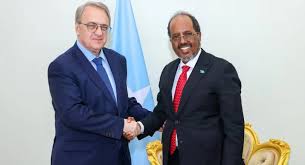Russia’s diplomatic efforts in Africa have reached new heights. Moscow is now strengthening its ties with Somalia, a strategically important country in the Horn of Africa. Mikhail Bogdanov, Russia’s Deputy Foreign Minister for the Middle East and African Countries, arrived in Mogadishu on Saturday for a high-level visit.
He was officially received at Aden Abdullah International Airport by Somalia’s Deputy Foreign Minister, Isaac Mohamud Mursal. Both emphasized the importance of promoting bilateral cooperation.
The visit marks Somalia’s addition to Russia’s growing list of African partners as the Kremlin strengthens its influence in Africa through economic diplomacy, security cooperation, and political engagement.
In a statement after the meeting, Mursal reaffirmed Somalia’s commitment to deepening relations with Russia. According to the Deputy Foreign Minister, Somalia is ready to deepen cooperation in energy, infrastructure, and trade.
“We are pleased to welcome Deputy Foreign Minister Bogdanov to Somalia and look forward to expanding our partnership in the coming years,” Mursal said.
Somalia’s location on key sea routes and its efforts to rebuild after years of conflict make it a key partner for countries vying for influence in Africa.
Russia’s engagement in Somalia underscores Moscow’s broader efforts to forge alliances in underserved but strategically important regions—a pattern that has intensified across Africa in recent years.
Although Bogdanov’s visit comes at a time Russia is trying to grow its influence in Africa, the discussions are expected to pave the way for greater Russian involvement in Somalia’s economic and security development.
For Somalia, strengthening ties with Moscow is an effort to diversify its international partnerships and attract new investment, infrastructure development, and security cooperation. However, for Moscow, the Horn of Africa is a region where stability, access to critical ports, and natural resources are important for global trade. Source: Horseed Media






